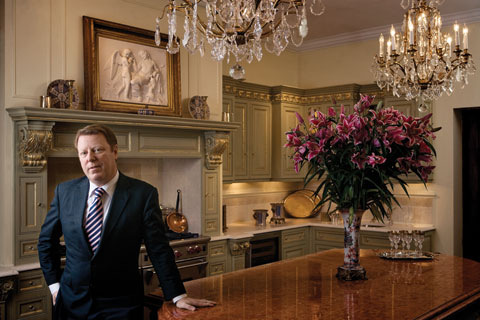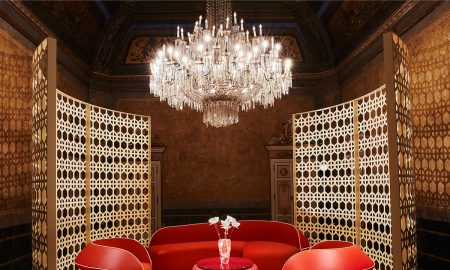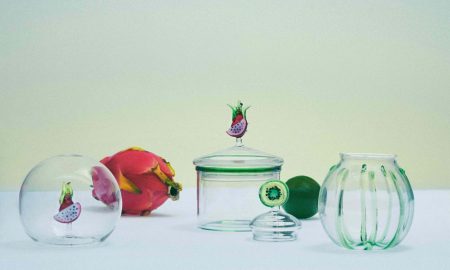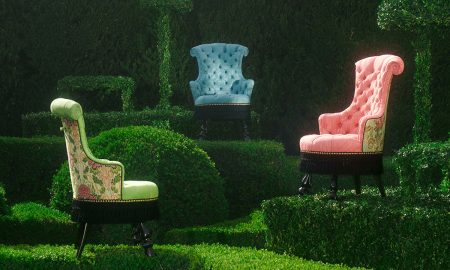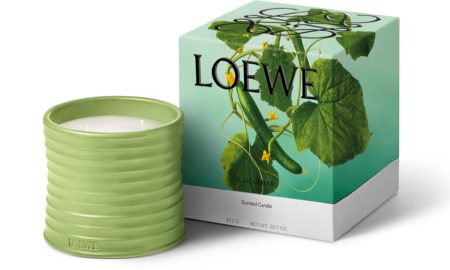Robert Hughes has turned the Clive Christian name into a must-have for today’s elite.
By Jennifer Math
Move over, Louis Vuitton. Clive Christian is about to break into the high-fashion market with a line of classic accessories including scarves, bags, belts, and ties.
How does one turn a small, English furniture company into a global luxury goods brand? Ask Robert Hughes, the CEO of Clive Christian New York. As the entrepreneur behind the name that is synonymous with world-renowned interior design solutions, extravagant and exotic perfumes, and a soon-to-be line of scarves, bags, and other leather goods, Hughes has dominated the market from all angles, and relished every minute of it.
As the chief executive officer, global sales director and proud owner of two franchise locations, Hughes is the ultimate triple threat. And before becoming the man behind the brand, he was no stranger to the home décor market. Owning his own Manhattan-based cabinet importing company gave Hughes the tools he needed to thrive in the design world. And it wasn’t until a business trip to Europe in the mid-90s that he came across the diminutive Clive Christian company in the north of England and envisioned bigger and better things in the Big Apple.
In 1996, Clive Christian New York opened to what seemed like overnight success. “From the minute we opened the store, it just took off,” says Hughes. And with success came more opportunity. “Everybody wanted to be a dealer for us,” he says, “and we continued to supply these people around the country on an exclusive basis.” Unlike other mom-and-pop shops that represented countless brands, Hughes insisted that his stores only carry the Clive Christian name—further branding the company as an elite entity.
Catering to the upper echelon of society, it’s no surprise that the Clive Christian name carries a lofty price tag. But money is no object for their clientele, which includes celebrities like Celine Dion, Oprah Winfrey, and Shania Twain, who are purchasing the security of the Clive Christian name along with the product.
Customers can choose from three furniture styles: Edwardian, Victorian, and Regency—each line echoing the aesthetic of their respective time period. From the simple and informal look of the Edwardian collection to the increasingly ornate Victorian and gold-leafed Regency line, each design is masterfully crafted to suit the client’s needs.
After establishing Clive Christian as a frontrunner in the home design market, Hughes was eager for the next endeavor. When given the opportunity to purchase a perfume house linked to England’s Queen Victoria, he jumped at the chance. After all, the rest of their products were already fit for royalty. In 2001, Hughes and Clive Christian bought the perfumery that dated back to 1872 and repackaged, remarketed, and reinvented each essence. Today, their line includes the delicate and distinct scents of 1872, X, and No1—all of which can be purchased at prestigious department stores like Bergdorf Goodman, Neiman Marcus, and Harrods. Perhaps the most coveted of all of the fragrances is the Imperial Majesty. Costing a cool $215,000, the perfume sits in a Baccarat crystal that features a five-carat brilliant-cut diamond nestled atop the 18-carat gold collar—living up to its title as “the world’s most expensive perfume.”
Whether it’s the fabulous furniture or the sophisticated scents, the Clive Christian brand stands above the rest. And ironically, it’s staying the same that makes them different. In an industry swayed by fashion and trends, Clive Christian continues to maintain its classic aesthetic. “You don’t have to reinvent the wheel every time,” says Hughes. “We have specific designs that are very traditional and popular, and we’ve done enough research to know that the look that we create is what people want.”
And Hughes plans to dominate yet another market with his timeless designs by early next year. Move over, Louis Vuitton. Clive Christian is about to break into the high-fashion market with a line of classic accessories including scarves, bags, belts, and ties. And like Dior of the 1950s, these styles will endure the ever-changing trends for years to come.
With a man as driven and determined as Hughes, it’s only natural for him to constantly look ahead. So what does the future hold for his burgeoning company? “The big expansion is in Eastern Europe,” he says. With more than 55 stores worldwide and a strong hold in the United States and Western European markets, it’s time to venture East. “Even South America will have its turn,” he says. “It’s probably just around the corner, so that will give us something to do in 2010.” Like any successful entrepreneur, Hughes will never be satisfied with status quo. “We’re only a 10-year-old company,” he says. “We’ve got a lot left to do.”







